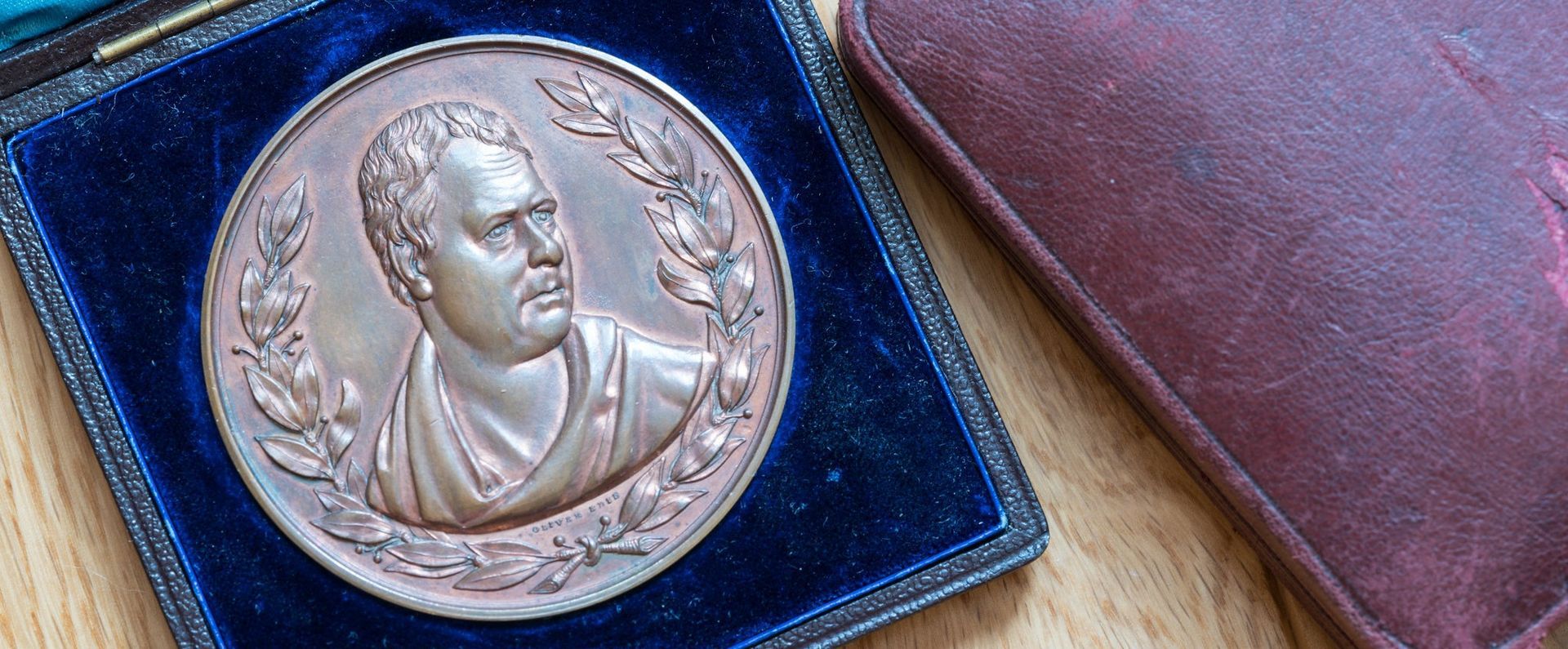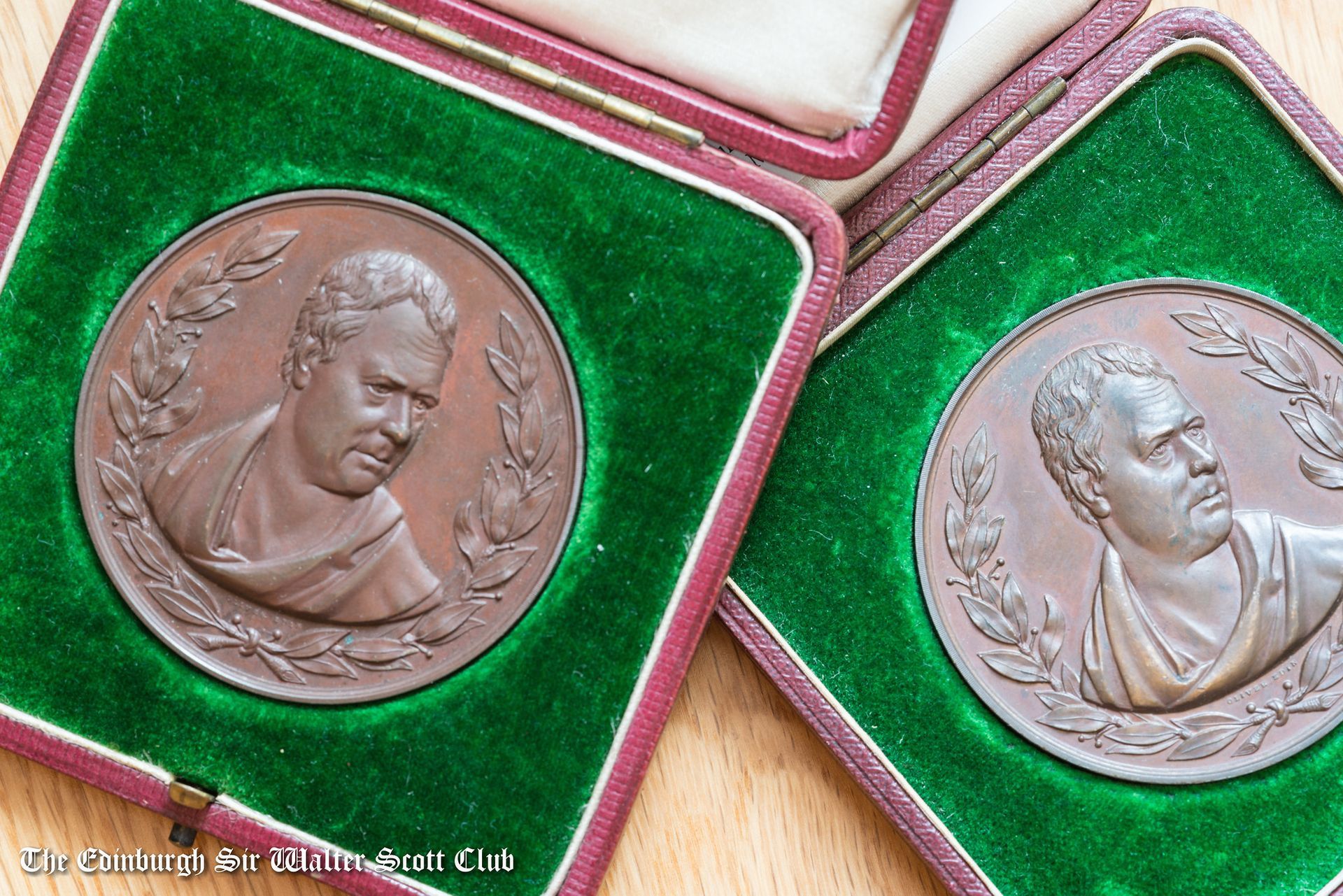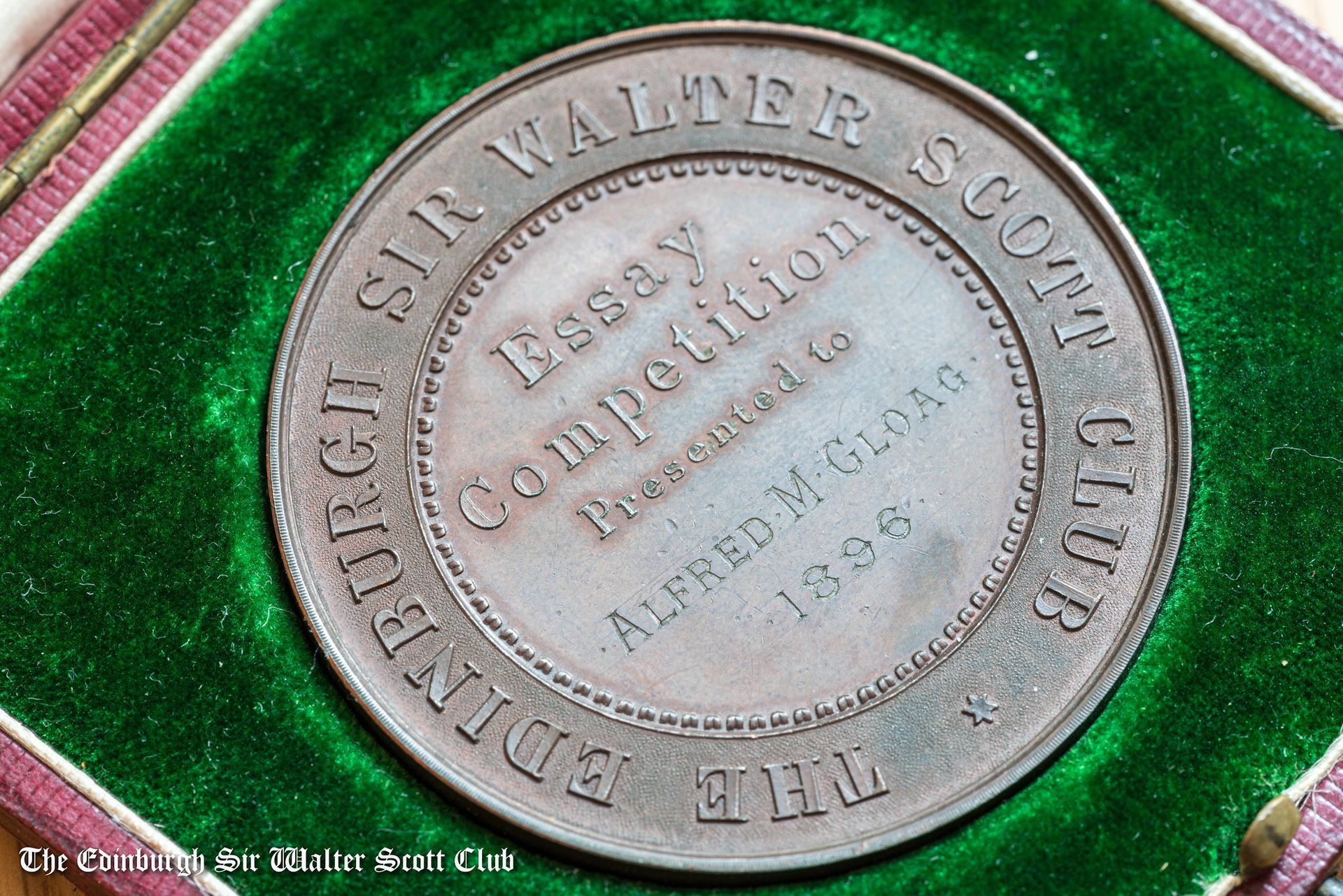Annual Essay Competition
Not long after the Club was founded, we set-up an Annual Essay Competition to encourage children to study the works of Sir Walter Scott.
It was an amazing success and within 15 years over 7000 school children were reading the prescribed book and of those almost 5000 submitted an essay into the Competition each year -- and most of these were Primary School Children!
Click on the link below to see some of the questions....
The scheme was such a success than the Club went into debt with the costs of running it and providing the prizes. But, luckily in 1908 an anonymous member donated £1000 which save us from collapse. The Club went into debt again in 1921 so it was decided to stop issuing the Medal as a prize in order to cut costs.
How it worked:
The children were told at the start of the school term which book they had to read. Then before Easter time, under the superintendence of the Headmasters of each school the children would write their Essays. Pupils were expected to answer two questions- one in each section. Three hours were allowed for the Secondary and Higher Grade Schools for the paper (no more than 1000 words), and just two hours for the Primary and Evening Schools (up to 500 words in length).
The Prizes included the Club Medal and a book - usually Lockhart's
Life of Scott, Scott's Poems or copies of
Tales of a Grandfather.

Interest in the competition dropped a little after WW1 but rose back again quite quickly. But, sadly it began to decline from 1924 when the Education Authority said they would no longer provide the books for the children. From 1937 less than two dozen schools took part. In 1949 a new Prize Scheme was announced to make it easier but interest continued to wane. Finally, after almost 70 years the Essay Prize was discontinued in 1965.
Interestingly, Sir Eric Anderson, the former Provost of Eton, admitted at one of the Club's meetings that he would never have gone on to edit Scott's Journal had he not won an Essay Prize as an Edinburgh schoolboy at George Watson's.
We no longer run an Essay Competition.
We did try a couple of times to revive it...but without any major success.
Since 2013 we have awarded a [Scottish Literary Studies Medal]
The Essay Competition Questions:
How do you think you would have got on?
Try a few of the Annual Essay Competition Questions - click on the link below:
Most Frequently Featured Books
Certain novels appeared more often in the Edinburgh Sir Walter Scott Club’s Essay Prize, particularly during its peak years. The most commonly assigned books included:
- The Heart of Midlothian – Featured multiple times across decades (1898, 1920, 1932, 1951, 1952, 1955, 1961).
- Ivanhoe – One of the most frequently assigned books (1907, 1923, 1933, 1947, 1958, 1963).
- Rob Roy – Repeatedly assigned (1905, 1927, 1937, 1949, 1955, 1962).
- Guy Mannering – A consistent choice (1900, 1912, 1926, 1952, 1958, 1963).
- Quentin Durward – Used often, including early and later years (1897, 1908, 1921, 1938, 1960).
- The Fortunes of Nigel – Selected across multiple decades (1904, 1924, 1948, 1964).
- Redgauntlet – Frequently chosen (1903, 1929, 1953, 1960).
- The Antiquary – Regularly featured (1915, 1925, 1934, 1954, 1960).
- Waverley – A significant choice due to its status as Scott’s first novel (1909, 1936, 1954, 1961).
- Old Mortality – Consistently assigned (1902, 1931, 1950, 1956).
Other books featured include Kenilworth, The Fair Maid of Perth, The Bride of Lammermoor, The Legend of Montrose, Woodstock, The Abbot, and The Pirate, though some were chosen less frequently.
Similarities in Essay Questions
Despite variations in the books assigned, the essay questions followed recurring themes:
- Character Studies – Many questions asked students to analyse individual characters.
- Example: "Sketch the character of Jeanie Deans." (The Heart of Midlothian)
- "Describe the character of Rob Roy as a product of his time." (Rob Roy)
- Comparisons Between Characters – A popular format was to contrast two major characters.
- "Compare and contrast the characters of Henry Gow and Conachar." (The Fair Maid of Perth)
- "Contrast the characters of Fergus MacIvor and Edward Waverley." (Waverley)
- Historical and Social Context – Many essays explored Scott’s depiction of historical settings.
- "What light does Kenilworth throw on the manners and customs of the time?"
- "Describe the social life of the Border Districts as depicted in Guy Mannering."
- Scott’s Writing Style and Themes – Some questions analysed Scott’s literary techniques.
- "Discuss Scott’s skill as a writer of romance from his treatment of historical facts."
- "Scott most persistently presents men in their habits as they lived—illustrate this with reference to George Heriot in The Fortunes of Nigel."
- Important Scenes and Events – Many questions focused on dramatic or key moments in the books.
- "Describe the scene of the trial by ordeal in St. John’s Church." (The Fair Maid of Perth)
- "Narrate the more picturesque incidents of the attack on Torquilstone Castle." (Ivanhoe)
- Scott’s Depiction of Scotland and National Identity – Some essays asked students to reflect on Scott’s portrayal of Scotland.
- "Write an appreciation of Scott’s presentment of Bonnie Prince Charlie in the '45." (Waverley)
- "Describe Bailie Nicol Jarvie and Andrew Fairservice as types of Scottish character." (Rob Roy)
- Moral and Ethical Questions – A few questions invited reflections on justice, loyalty, and duty.
- "On the power of the Scottish nobles and their treatment of the lower orders." (The Fair Maid of Perth)
- "Discuss the statement: 'Diana Vernon is the most charming of Scott’s heroines.'" (Rob Roy)
Trends in the Questions Over Time
- Early Years (1890s–1920s):
- More focus on plot details and factual recall.
- Questions often required students to describe events rather than interpret them deeply.
- Mid-Period (1920s–1940s):
- Greater emphasis on character analysis and historical context.
- More comparative questions emerged, encouraging students to contrast figures within or across novels.
- Later Years (1950s–1965):
- Shift toward literary analysis and critical engagement with Scott’s themes and style.
- More abstract and evaluative questions, e.g., "Discuss Scott as a historical novelist."
1. Early Popularity and Growth (Late 19th – Early 20th Century)
- The competition was highly successful, with thousands of children reading Scott’s works and submitting essays.
- Many entries came from primary school children, indicating a strong early engagement with Scott’s novels.
- The Club even struggled financially due to the cost of running the competition and awarding prizes.
2. Peak Participation (1900s – 1910s)
- Participation steadily increased, with some years seeing over 7,000 children reading Scott’s novels and thousands submitting essays.
- The range of participating schools included primary, secondary, evening continuation, and intermediate schools.
- The competition was well-integrated into the school curriculum, with structured essay topics focusing on literary analysis, historical context, and character studies.
3. Gradual Decline (1920s – 1930s)
- The competition suffered a major setback in 1924 when the Education Authority stopped providing books, leading to declining interest.
- By the late 1930s, participation had dropped significantly, with only a few dozen schools taking part.
- This period saw a shift from large-scale engagement to a more limited number of schools continuing the tradition.
4. Final Years and Discontinuation (1940s – 1965)
- Various attempts were made to revamp the prize with changes in format, but interest continued to decline.
- By the 1950s, multiple Scott texts were included in a single year, possibly to diversify engagement.
- In 1965, after nearly 70 years, the competition was formally discontinued.
5. Unsuccessful Revival Attempts (1970s – 2014)
- The Club made several attempts to revive the prize:
- In the late 1970s, it was limited to one selected school each year.
- In the 1980s, it shifted to university students with a cash prize, but interest was minimal.
- In 2014, the Club attempted another revival but found that modern students rarely read Scott, with teachers prioritizing simpler texts for exam results.
6. Shift to University-Level Recognition (Since 2013)
- Instead of an essay competition, the Club now awards the Scottish Literary Studies Medal in collaboration with Edinburgh University.
- The medal is given to a student excelling in Scottish literature, with particular recognition when they study Scott’s novels.
Overall Trends:
- From Mass Participation to Niche Interest: What started as a large-scale school initiative became a university-level recognition due to changing reading habits.
- Curricular Changes: Schools moved away from Scott, making it difficult to sustain engagement at the primary/secondary level.
- Relevance Struggles: Attempts to reintroduce Scott to students failed due to perceptions of difficulty and lack of alignment with modern educational priorities.
- A Shift in Strategy: The Club adapted by supporting university-level study rather than re-establishing the competition.




